
Recent research on elenolic acid, a natural compound found in olives, suggests it can lower blood sugar levels and promote weight loss.
This discovery could lead to the development of safe and affordable natural products for managing obesity and type 2 diabetes in humans.
In a study conducted on obese diabetic mice, those given oral elenolic acid for just one week weighed significantly less and had better blood sugar regulation than before treatment and compared to control mice not receiving the compound.
The glucose-lowering effect of elenolic acid was found to be comparable to the injectable diabetic medication liraglutide and superior to metformin, a common oral medication for type 2 diabetes.
“Lifestyle changes and public health measures have had limited success in reducing obesity rates, a major risk factor for type 2 diabetes,” said Dongmin Liu, Ph.D., a professor at Virginia Tech’s Department of Human Nutrition, Foods and Exercise.
“Current obesity drugs are often ineffective for long-term weight loss, expensive, and may have long-term safety risks. Our goal is to develop safer, cheaper, and more convenient agents that can prevent metabolic disorders and type 2 diabetes.”
Hana Alkhalidy, Ph.D., a research scientist in Liu’s lab, presented the findings at NUTRITION 2024, the annual meeting of the American Society for Nutrition held from June 29 to July 2 in Chicago.
The Study’s Approach and Findings
Liu’s research team specializes in identifying bioactive compounds from natural products for diabetes management. They previously searched for molecular targets in the pancreas, muscles, fat tissues, and liver.
However, given the poor bioavailability of many natural products, the team decided to focus on targeting metabolic hormone secretion in the gut to regulate metabolic function indirectly.
In their new study, the researchers identified natural compounds that act on L-cells, which release two metabolic hormones during a meal: GLP-1 and PYY. These hormones work together to promote satiety, prevent overeating, and control blood sugar levels and metabolism.
Through their screening process, the researchers discovered that elenolic acid, found in mature olives and extra virgin olive oil, can induce the release of these hormones in the gut.
They produced elenolic acid by breaking down its precursor oleuropein, which is less costly than extracting it directly from olives.
Tests on obese diabetic mice showed significant improvements in metabolic health for those that received oral elenolic acid compared to control mice.
After four to five weeks of treatment, these mice exhibited a 10.7% reduction in obesity, as well as blood sugar levels and insulin sensitivity comparable to healthy lean mice.
Additionally, elenolic acid significantly reduced food intake and promoted weight loss, improvements linked to increased circulating levels of PYY and GLP-1 and the downregulation of agouti-related peptide in the hypothalamus.
Agouti-related peptide is known to increase eating and weight gain when overexpressed.
Implications and Future Research
“The study showed that elenolic acid from olives has promising effects on hormone release and metabolic health, particularly in obese and diabetic conditions,” said Liu.
“The compound appears to mimic the physiological conditions of eating to directly promote gut metabolic hormone secretion, which helps regulate energy balance and metabolic health.”
The researchers noted that the concentration of elenolic acid in olive oil or olives is very low, so the benefits observed in this study would likely not be achieved by consuming olive products alone.
The team is now working to understand how elenolic acid provides these metabolic benefits by studying its absorption, distribution, metabolism, and excretion in the body. This will also help determine its safety for future clinical trials.
In conclusion, elenolic acid from olives shows great potential as a natural treatment for obesity and type 2 diabetes. With further research and development, it could become a safe, effective, and affordable option for managing these widespread health issues.
If you care about weight loss, please read studies that hop extract could reduce belly fat in overweight people, and early time-restricted eating could help lose weight .
For more information about weight loss, please see recent studies that Mediterranean diet can reduce belly fat much better, and Keto diet could help control body weight and blood sugar in diabetes.
Copyright © 2024 Knowridge Science Report. All rights reserved.



